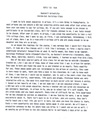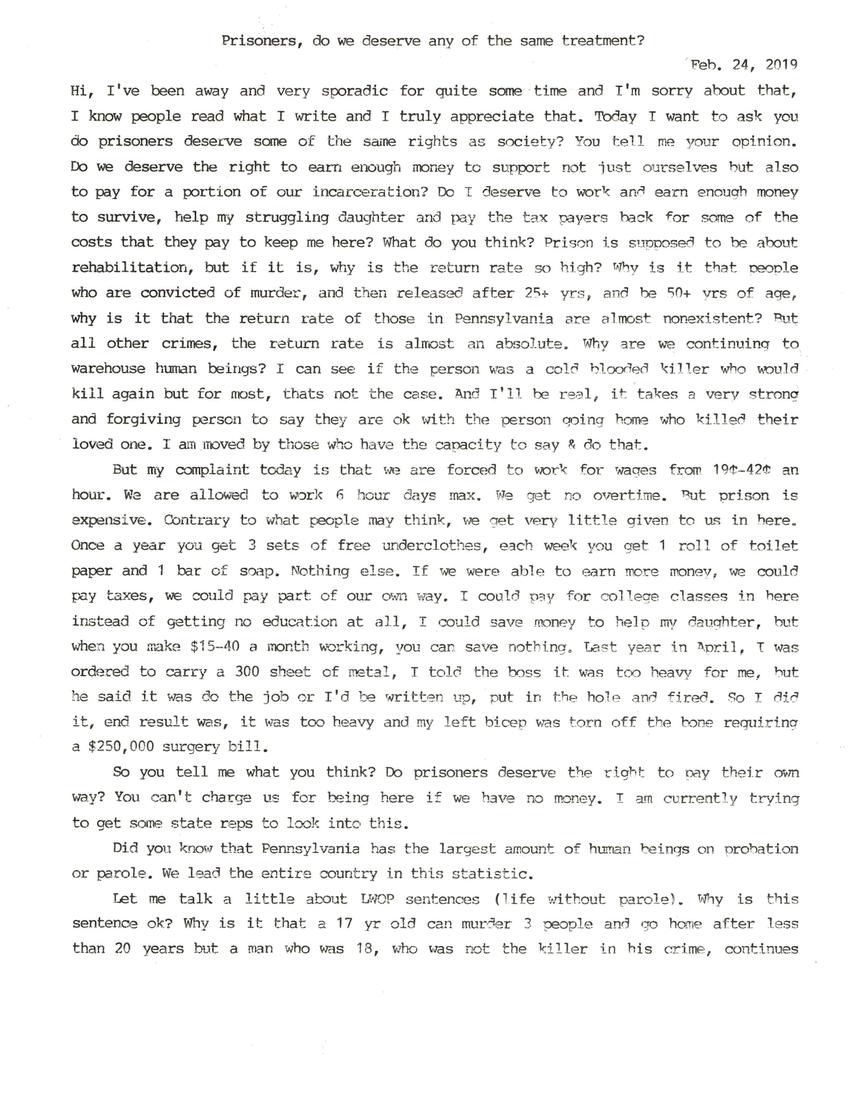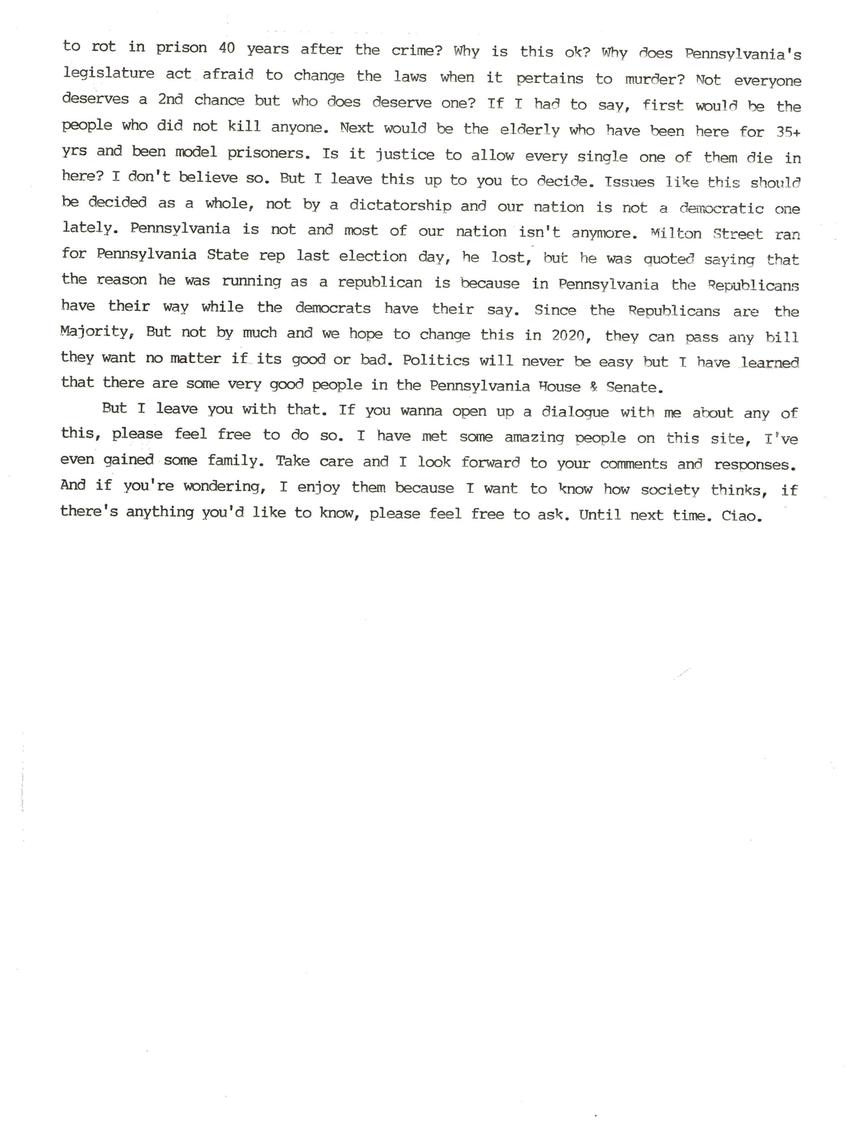
Transcription
February 24, 2019
Prisoners, do we deserve any of the same treatment?
Hi. I've been away and very sporadic for quite some time, and I'm sorry about that. I know people read what I write and I truly appreciate that.
Today I want to ask you: do prisoners deserve some of the same rights as society? You tell me your opinion. Do we deserve the right to earn enough money to support not just ourselves but also a portion for the incarceration? Do I deserve to work and earn enough money to survive, help my struggling daughter, and pay the taxpayers back fro some of the costs that they pay to keep me here? What do you think?
Prison is supposed to be about rehabilitation. But if it is, why is the return rate so high? Why is it that people who are convicted of murder and then released after 25+ years at 50+ years of age? Why is it that the return rate of those in Pennsylvania are almost nonexistent? But all other crimes, the return rate is almost an absolute. Why are we continuing to warehouse human beings?
I can see if the person was a coldblooded murderer, but for that's not the case for most. And I'll be real: it takes a very strong and forgiving person to say they are okay with the person going home who killed their loved one. I am moved by those who have the capacity to say and do that.
But my complaint today is that we are forced to work for wages from 19 cents to 42 cents an hour. We are allowed to work six hour days max. We get no overtime.
And prison is expensive. Contrary to what people think, we get very little given to us here. Once a year, you get three sets of free underclothes. Each week you get one roll of toilet paper and one bar of soap. Nothing else. If we were able to earn more money, we could pay taxes. We could pay part of our own way. I could pay for college classes in here instead of getting no education at all. I could save money to help my daughter. But when you make $15-$40 a month working, you can save nothing.
Last year in Aprol, I was ordered to carry a 300 sheet of metal. I told the boss it was too heavy for me, but he said it was do the job or get written up, put in the hole, and fired. So I did it. The end result was it was too heavy and my left bicep was torn off. The bone required a $250,000 surgery bill.
So you tell me: what do you think? Do prisoners deserve the right to pay their own way? You can't charge us for being here if we have no money. I am currently trying to get some state reps to look into this.
Did you know that Pennsylvania has the largest amount of human beings on probation or parole? We lead the entire country in this statistic.
Let me talk a little about LWOP (life without parole) sentences. Why is this sentence okay? Why is it that a 17 year old can murder three people and go home after less than 20 years, but a man who was 18, who was not a killer in his crime, rot in prison for 40 years after the crime? Why is this okay? Why does Pennsylvania's legislature act afraid to change the laws when it pertains to murder? Not everyone deserves a second chance, but who does deserve one?
If I had to say, first would be the people who did not kill anyone. Next would be the elderly who have been here for 35+ years and been model prisoner. Is it justice to allow every single one of them to die in here? I don't believe so, but I leave this up to you to decide.
Issues like these should be decided as a whole not by a dictatorship. Our nation is not a democratic one lately. Pennsylvania is not and most of our nation isn't anymore. Milton Street ran for Pennsylvania state representative last election day. He lost, but he was quoted as saying that the reason he was running as a Republican is because the Republicans have their way while the Democrats have their say in Pennsylvania.
Since the Republicans are the majority (but not by much), we hope this will change in 2020. They can pass any bill they want no matter if it's good or bad. Politics will never be easy, but I have learned that there are some very good people in the Pennsylvania House and Senate.
But I leave you with that. If you wanna open up a dialogue with me about any of this, please feel free to do so. I have met some amazing people on this site. I've even gained some family. Take care, and I look forward to your comments and responses. And if you're wondering, I enjoy them because I want to know how society thinks. If there's anything that you want to know, please feel free to ask.
Until next time. Ciao.
Other posts by this author
|
2024 may 17

|
2024 may 14

|
2024 feb 27

|
2024 jan 23

|
2023 sep 2

|
2022 aug 4

|
More... |



Replies (6)
one part of what you wrote made me think of something I read. The part of it taking a very frogiving person to being ok with someone released that killed a loved one. Well, after looking up the article I realized it is rather about victims that survived the crime, but still I think it might be interesting. Its writte by Michelle Alexander recently in NYT, I give you the interesting passages:
Reckoning With Violence
We must face violent crime honestly and courageously if we are ever to end mass incarceration and provide survivors what they truly want and need to heal.
(...)And yet, as Danielle Sered points out in her profoundly necessary book, “Until We Reckon,” if we fail to face violence in our communities honestly, courageously and with profound compassion for the survivors — many of whom are also perpetrators of harm — our nation will never break its addiction to caging human beings.
Fifty-four percent of the people currently held in state prisons have been convicted of a crime classified as violent. We will never slash our prison population by 50 percent — the goal of a number of current campaigns — much less get back to levels of incarceration that we had before the race to incarcerate began in the early 1980s, without addressing the one issue most reformers avoid: violence.
Reckoning with violence in a meaningful way does not mean “getting tough” in the way that phrase has been used for decades; nor does it mean being “smart on crime” to the extent that phrase has become shorthand for being “tough” on violent crime but “soft” on nonviolent crime — a formulation that continues to be embraced by some so-called “progressive prosecutors” today. As Ms. Sered explains in her book, drawing on her experience working with hundreds of survivors and perpetrators of violence in Brooklyn and the Bronx, imprisonment isn’t just an inadequate tool; it’s often enormously counterproductive — leaving survivors and their communities worse off.
Editors’ Picks
The 87-Year-Old Hobbyist Who Measures the Royal Family’s Workload
‘Tell Your Husband to Leave Me Alone’
Her Husband Did the Unthinkable. This Is a Play About Everything After.
Survivors themselves know this. That’s why fully 90 percent of survivors in New York City, when given the chance to choose whether they want the person who harmed them incarcerated or in a restorative justice process — one that offers support to survivors while empowering them to help decide how perpetrators of violence can repair the damage they’ve done — choose the latter and opt to use the services of Ms. Sered’s nonprofit organization, Common Justice.
Ninety percent is a stunning figure considering everything we’ve been led to believe that survivors actually want. For years, we’ve been told that victims of violence want nothing more than for the people who hurt them to be locked up and treated harshly. It is true that some survivors do want revenge or retribution, especially in the immediate aftermath of the crime. Ms. Sered is emphatic that rage is not pathological and a desire for revenge is not blameworthy; both are normal and can be important to the healing process, much as denial and anger are normal stages of grief.
But she also stresses that the number of people who are interested only in revenge or punishment is greatly exaggerated. After all, survivors are almost never offered real choices. Usually when we ask victims “Do you want incarceration?” what we’re really asking is “Do you want something or nothing?” And when any of us are hurt, and when our families and communities are hurting, we want something rather than nothing. In many oppressed communities, drug treatment, good schools, economic investment, job training, trauma and grief support are not available options. Restorative justice is not an option. The only thing on offer is prisons, prosecutors and police.
But what happens, Ms. Sered wondered, if instead of asking, “Do you want something or nothing?” we started asking “Do you want this intervention or that prison?” It turns out, when given a real choice, very few survivors choose prison as their preferred response.
This is not because survivors, as a group, are especially merciful. To the contrary, they’re pragmatic. They know the criminal justice system will almost certainly fail to deliver what they want and need most to overcome their pain and trauma. More than 95 percent of cases end in plea bargains negotiated by lawyers behind the scenes. Given the system’s design, survivors know the system cannot be trusted to validate their suffering, give them answers or even a meaningful opportunity to be heard. Nor can it be trusted to keep them or others safe.
Sign Up for Paul Krugman's Newsletter
Paul Krugman did explanatory journalism before it was cool, moving from a career as a world-class economist to writing hard-hitting opinion columns.
SIGN UP
As one woman whose 14-year-old son had been badly beaten and robbed explained to Ms. Sered, “When I first found out about this, I wanted the young man to drown to death. And then I wanted him to burn to death. And then I realized as a mother that I don’t want either of those things. I want him to drown in a river of fire.” But when she reflected on the fact that the young man who harmed her son would eventually return home from prison and cross paths with her children again, she said, “I have to ask myself: When that day comes, do I want that young man to have been upstate or do I want him to have been with y’all?”
The restorative circle, a meeting during which responsible parties sit with those they have harmed (or surrogates who take their place), a trained facilitator, and people who support both parties, is central to the process. It offers those affected by a crime with the power and opportunity to ask questions, as well as describe their needs and the ways they’ve been harmed. Ultimately, the parties strive to reach agreement about what the responsible party can do to make things as right as possible. The circle can be transformative for both survivors and those who’ve caused harm. In Ms. Sered’s experience, survivors not only want answers to factual questions, they want acknowledgment of their suffering and the moral wrongs. They want to be able to say: “How dare you? My brother was killed the year before you stabbed me. Can you imagine how it felt to my mother to get the call from the hospital that I was unconscious in the E.R. and had been stabbed?” Sered explains.
Witnessing the pain and anguish of survivors, and taking full responsibility for what they’ve done by committing to specific actions to repair themselves and others, has a far greater impact on those who’ve committed harm than we might imagine. One young man, who had been a gang member since he was 8 years old, could not leave the building after participating in a restorative circle with Common Justice because he was shaking so badly after admitting the harm he had done. He asked staff members, “Can I stay in your office for a few minutes before I leave?” When asked to explain, he said, “You know, for all I’ve done and all that’s been done to me, I don’t know if I’ve ever heard a real apology before. Do you think I did all right?
A growing body of research strongly supports the anecdotal evidence that restorative justice programs increase the odds of safety, reduce recidivism and alleviate trauma. “Until We Reckon” cites studies showing that survivors report 80 to 90 percent rates of satisfaction with restorative processes, as compared to 30 percent for traditional court systems.
Common Justice’s success rate is high: Only 7 percent of responsible parties have been terminated from the program for a new crime. And it’s not alone in successfully applying restorative justice principles. Numerous organizations — such as Community Justice for Youth Institute and Project NIA in Chicago; the Insight Prison Project in San Quentin; the Community Conferencing Center in Baltimore; and Restorative Justice for Oakland Youth — are doing so in communities, schools, and criminal justice settings from coast-to-coast.
In 2016, the Alliance for Safety and Justice conducted the first national poll of crime survivors and the results are consistent with the emerging trend toward restorative justice. The majority said they “believe that time in prison makes people more likely to commit another crime rather than less likely.” Sixty-nine percent preferred holding people accountable through options beyond prison, such as mental health treatment, substance abuse treatment, rehabilitation, community supervision and public service. Survivors’ support for alternatives to incarceration was even higher than among the general public.
Survivors are right to question incarceration as a strategy for violence reduction. Violence is driven by shame, exposure to violence, isolation and an inability to meet one’s economic needs — all of which are core features of imprisonment. Perhaps most importantly, according to Ms. Sered, “Nearly everyone who has committed violence first survived it,” and studies indicate that experiencing violence is the greater predictor of committing it. Caging and isolating a person who’s already been damaged by violence is hardly a recipe for positive transformation.
That said, Ms. Sered makes clear that she doesn’t believe that having been a victim of crime excuses acts of violence in any way: “When we hurt someone, we incur an obligation. Period.” In fact, it seems her greatest complaint about our system of mass incarceration is that it fails to take accountability seriously. Our criminal injustice system lets people off the hook, as they aren’t obligated to answer the victims’ questions, listen to them, honor their pain, express genuine remorse, or do what they can to repair the harm they’ve done. They’re not required to take steps to heal themselves or address their own trauma, so they’re less likely to harm others in the future. The only thing prison requires is that people stay in their cages and somehow endure the isolation and violence of captivity.
Ms. Sered acknowledges that we, as a society, are not yet prepared to apply restorative and transformative justice principles to all crimes of violence. Some people do need to be separated in order to keep others safe. But if we invest our resources in the healing, restoration and rebuilding of relationships and communities — and stop pretending that caging people on a massive scale makes our communities safer — we just might discover that we are capable of reckoning with one another."
Hope you find this interesting too, Robert.
Have a good day, Julia